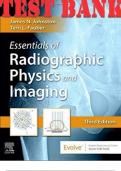,Chapter 01: Introduction to the Imaging Sciences
Johnston/Fauber: Essentials of Radiographic Physics and Imaging, 3rd Edition
MULTIPLE CHOICE
1. X-rays were discovered
a. November 8, 1805
b. November 8, 1875
c. November 8, 1895
d. November 8, 1985
ANS: C
X-rays were discovered November 8, 1895.
2. Barium platinocyanide was the material in Dr. Roentgen’s laboratory that
a. covered the cathode ray tube
b. fluoresced when the cathode ray tube was energized
c. was used to produce the radiograph of Bertha Roentgen’s hand
d. protected the people in the room from the x-rays
ANS: B
A piece of cardboard covered with barium platinocyanide fluoresced when the tube was
energized, leading to further investigation.
3. Wilhelm Roentgen’s lab was located in
a. Wurzburg
b. Zurich
c. Paris
d. Boston
ANS: A
Dr. Roentgen’s lab was located at the University of Wurzburg in Wurzburg, Germany.
4. The first radiograph produced by Dr. Roentgen was of
a. his own hand
b. his daughter’s hand
c. his son’s hand
d. his wife’s hand
ANS: D
The first radiograph was taken December 22, 1895, of his wife, Bertha’s, hand.
5. Exposure times for very early radiographs ranged from
a. 1 second to 5 seconds
b. 1 minute to 15 minutes
c. 20 minutes to 2 hours
d. 2 hours to 5 hours
ANS: C
Exposure times for early radiographs took from 20 minutes to 2 hours to produce an image.
, 6. Acute radiodermatitis was
a. the radiation burn resulting from excessive exposure to x-rays
b. common among early patients and operators of x-ray equipment
c. a delayed reaction to excessive x-ray exposure
d. all of these
ANS: D
Early on, the excessive radiation exposure to many operators and patients resulted in
radiation burns, a delayed response to the exposure.
7. Who brought attention to the dangers of x-rays?
a. Wilhelm Roentgen.
b. Bertha Roentgen.
c. Crookes.
d. Thomas Edison.
ANS: D
Thomas Edison, the famous American inventor, suffered a radiation burn and brought
attention to the dangers of x-rays.
8. An example of how x-rays were used for entertainment or business gain in a dangerous
manner was the
a. fluoroscopic shoe fitter
b. x-ray stove polish
c. x-ray headache tablets
d. x-ray golf balls
ANS: A
Although the stove polish, headache tablets, and golf balls used “x-ray” in their names, the
shoe fitter actually exposed shoppers to radiation.
9. Mass, length, and time are considered
a. fundamental quantities
b. derived quantities
c. radiologic quantities
d. none of these
ANS: A
Mass, length, and time are the most basic or fundamental quantities.
10. Velocity, acceleration, and work are
a. fundamental quantities
b. derived quantities
c. radiologic quantities
d. none of these
ANS: B
Along with force, momentum and power, velocity, acceleration, and work are derived from
the fundamental quantities.
, 11. Exposure, dose, and dose equivalent are
a. fundamental quantities
b. derived quantities
c. radiologic quantities
d. none of these
ANS: C
Along with the measure of radioactivity, dose, dose equivalent, and exposure are radiologic
quantities.
12. The metric system is also known as the
a. British system
b. System International (SI)
c. System of Units (SU)
d. French system
ANS: B
The metric system is also known as the System International (SI).
13. In the SI system the unit of measure for mass is
a. pound
b. gram
c. kilogram
d. ton
ANS: C
The SI system uses kilogram to quantify mass.
14. In the SI system the unit of measure for length is
a. meter
b. kilometer
c. foot
d. mile
ANS: A
The SI system uses meter to quantify length.
15. In the SI system the unit of measure for time is
a. minute
b. second
c. hour
d. day
ANS: B
The SI system uses second to quantify time.
16. In the British system the unit of measure for mass is
a. pound
b. gram
c. kilogram
d. ton




